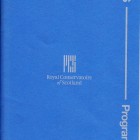High Court of the Gods 2018Royal Conservatoire of Scotland
Read more about the opera High Court of the Gods
This was one of the regular programmes mounted with a mixed group of Conservatoire students for training and assessment purposes. These usually take the form of extended excerpts rather than just arias, duets, etc., so that the participants get practice with recitative, dialogue and acting, rather than 'just' having to sing their big solos. They can pop in occasional one-liners to assist in other scenes, while doing major solos elsewhere. They also have to perform confidently in several languages.
On this occasion, instead of merely being titled as Opera Scenes, the evening was The High Court of the Gods, an indication that an attempt was being made to introduce a unifying theme. In this case, all the scenes were connected in some way with the idea of justice as portrayed in Classical Greek drama and myth. Thus the evening kicked off with Iphigenia and her two associates presiding as court officials to assess the various plots. She dreama of what has happened back home - the recognition scene between Elektra and Orest - then at the end (nearly three hours later) she reappears, intent on executing the visitor, before the arrival of Diana resolves matters. Some of the links worked better than others.
Perhaps surprisingly, the repertoire excluded Monteverdi and Handel. Excellent training ground, but they have featured prominently in recent performances at RCS. The operas that did feature were by Gluck (Orfeo ed Euridice, Iphigénie en Tauride); Mozart (Idomeneo); Cherubini (Médée); Berlioz (Les Troyens); Offenbach (Orphée aux enfers); Strauss (Elektra, Ariadne auf Naxos) and Stravinsky (Oedipus Rex). In the case of Iphigénie, Ariadne and Oedipus we had two extracts, of the others just one.
The current batch of students shows an inspiringly varied range of talents. This can be shown most easily by indicating that the first five sopranos listed each revealed astonishing technical maturity as Elektra, Medea, Ariadne, Zerbinetta and Iphigenia, respectively. Fortunately the first two are unlikely to attempt the complete, fiendishly demanding roles anytime soon, but they showed excellent accomplishment and promise for the future. There were plenty of highlights and unexpected elements. Indeed the tenot Orphée in the Offenbach even played his own violin.
With such a huge programme it was a sensible decision to employ two pianists in alternation, Aymeric Catalano and Marianna Abrahamyan. One generally played two items while the other turned the pages. Then they swapped - an entirely sensible solution, though they were both worked hard. The orchestra was seriously missed only in the massive climax of the Recognition Scene from Elektra. Duncan Williams was named as Musical Director, and clearly most of his work was done during rehearsals, with cueing only required during the few ensembles - especially valuable in Ariadne.
While the evening produced much singing and acting (and playing) of a very high standard, the whole was just a little bit indigestible. For a start, it was a long evening (7.15 to 10.15) requiring great concentration, which lacked the sense of flow of a complete opera. The trial scene concept added little. There was only one sequence that really jarred musically and dramatically, when Medea was building up to the murder of her children, only to be interrupted by Ariadne's comedians coming on to cheer her up.
There were so many good things that it is difficult to highlight them. Particular enjoyment was provided by the two ensembles from Ariadne auf Naxos, with lovely solo work from Ariadne herself in the first, Harlekin and Zerbinetta in the second, ably backed up by nymphs and comedians. The Idomeneo sequence managed to build a lot of emotion very quickly, while the doom-laden atmosphere of Oedipus Rex also worked well. The real surprises were the confidence with which they dealt with the power of Elektra and the hair-raising finale of Médée (a work long overdue for revival in Scotland). The Trojans excerpt also had the benefit of highlighting the often overlooked earlier part of the opera, before it is dominated by Dido and Aeneas - the Cassandra/Choroebus scene really works. All three Gluck sequences went well, but having so much at the start of the evening was a bit unbalanced.
The full programme was
Gluck: Iphigénie en Tauride - Iphigenia's dream and 'Ô toi qui prolongea mes jours' (CW Iphigenia, HB Priestess 1, FJ Priestess 2; AC pianist)
Strauss: Elektra - Recognition Scene (EM Elek tra, MN Orest; AC pianist)
Gluck: Orfeo ed Euridice - 'Che fiero momento', Euridice's Death and 'Che farò' (ES Euridice, JH Orfeo; MA pianist)
Berlioz: Les Troyens - Cassandra's Prophecy and Duet (FJ Cassandre, CD Chorèbe; MA pianist)
Stravinsky: Oedipus Rex - Oedipus questions Tiresias (ABe Oedipus, RT Tiresias; MA pianist)
Strauss: Ariadne auf Naxos - Ariadne in mourning (JD-W Ariadne, RS Naiad, SvS Dryad, StS Echo, ABr Harlekin, NC Zerbinetta, RT Truffaldino, RP Scaramuccio; AC pianist)
Offenbach: Orphée aux enfers - Argument (FJ Public Opinion, StS Euridice, SB Orpheus; MA pianist)
Stravinsky: Oedipus Rex - Revelation Duet (CH Jocasta, TK Oedipus; AC pianist)
Mozart: Idomeneo - Rejection Scene (ABe Idomeneo, JH Idamante; MA pianist)
Cherubini: Médée - Final Scene (RG Medea; AC pianist)
Strauss: Ariadne auf Naxos - Quartet to 'Grossmächtige Prinzessin' (NC Zerbinetta, ABr Harlekin, SB Brighella, RP Scaramuccio, RT Truffaldino; MA pianist)
Gluck: Iphigénie en Tauride - Final scene (CW Iphigenia, HB Priestess 1, FJ Ptiestess 2, MN Oreste, StS Woman, RG Diana, RP Pylade, CD Thoas; AC pianist.
